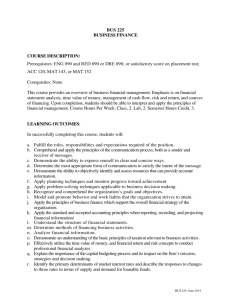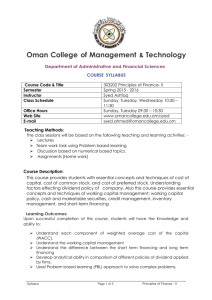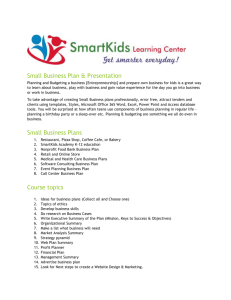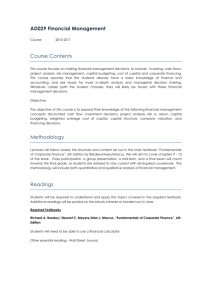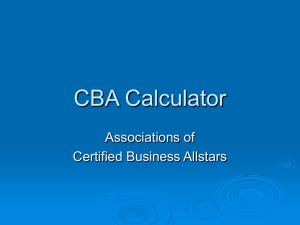SALEM COMMUNITY COLLEGE COURSE SYLLABUS COVER SHEET Action Taken (Please Check One)
advertisement
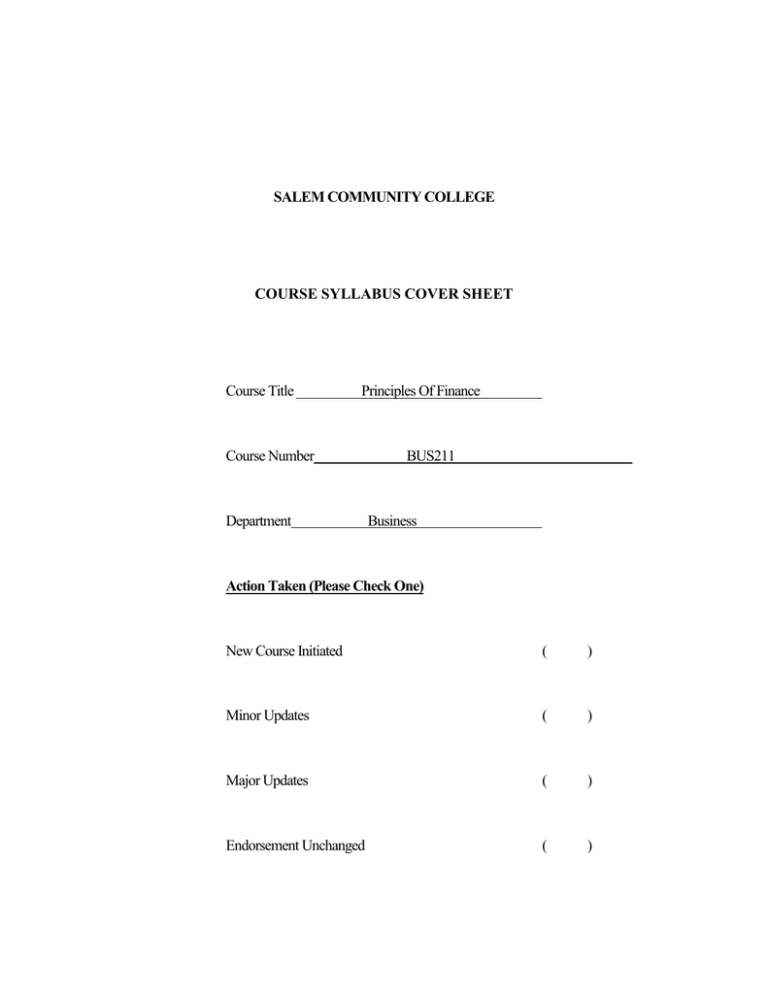
SALEM COMMUNITY COLLEGE COURSE SYLLABUS COVER SHEET Course Title Principles Of Finance Course Number Department BUS211 Business Action Taken (Please Check One) New Course Initiated ( ) Minor Updates ( ) Major Updates ( ) Endorsement Unchanged ( ) * Master Copy is Available on Diskette * Code Original Date of Syllabus Date of Last Official Change Semester Offered Faculty Member * Academic Affairs use only ( ) COURSE SYLLABUS Section I PRINCIPLES OF FINANCE Course Code: BUS 211 Lecture Hours: 3 Laboratory Hours: 0 Credits: 3 Course Description: Introduction to corporate financial management. This course will study the roles and functions of the financial manager within the corporate form of business organization. The major topics to be covered included the objectives and functions of financial management, the financial environment affecting the firm, time value of money, capital budgeting, management and financing of working capital, financial analysis and planning, and debt structure. Students are expected to have experience using Excel. Prerequisite: ACC121. Please note ACC122 may be taken concurrently. Co-Requisite: None Place in College Curriculum: BUS211 is a required course in the Business Administration AS degree program. Date Of Last Revision: Section II Course Content Outline I. Fundamental Concepts and Basic Tools of Finance A. Goal of the firm and financial management 1. Maximization of shareholders’ wealth 2. Maximization of profits B. Financial Statements C. The Time Value of Money Part 1 Simple Approach D. The Time Value of Money Part 2 Complex Approach E. Interest Rates II. Valuation of Stocks and Bonds A. Bonds and Bond Valuation B. Stocks and Stock Valuation C. Risk and Return III. Capital Budgeting A. Capital Budgeting Decision Models B. Cash Flow Estimations C. The Cost of Capital IV. Financial Planning and Evaluating Performance A. Forecasting and Short-Term Financial Planning B. Working Capital Management C. Financial Ratios and Firm Performance V. Capital Structure A. Creation of value B. Financial leverage C. Capital structure determination D. Dividend policy E. Long term financing Section III Course Performance Objective #1: The student will identify and goal and functions of financial management and compare this with the goals of maximizing wealth and maximizing earnings. Learning Outcomes: Students will: 1. Define maximizing of shareholders’ wealth 2. Define maximizing of earnings 3. Compare the goals of maximizing wealth and earnings 4. Explain the investing function 5. Explain the financing function 6. Explain financial analysis and planning Course Performance Objective #2: The student will identify the major elements of the environment of financial management, describe the role and functions of financial markets and financial intermediaries, and identify and describe the factors affecting yields. Learning Outcomes: Students will: 1. Identify the major external environmental factors affecting financial management 2. Define fiscal and monetary policies 3. Calculate corporate income taxes 4. Define the yield curve of U.S. Treasury securities 5. Identify and define the factors affecting yields on specific debt securities 6. Define and explain the significance of risk aversion in financial decision making Course Performance Objective #3: The student will explain the concept of time value of money, perform time value of money calculations, and use time value of money concepts to value financial securities. Learning Outcomes: Students will: 1. Explain the time value of money concept 2. Calculate present and future values, annuities and payments, and rates per period. 3. Explain what a bond is 4. Define coupon rate, maturity value, and term to maturity 5. Calculate a bond’s periodic interest payment 6. Calculate a bond’s market value when market rates are different than coupon rate 7. Define interest rate risk 8. Calculate the market value of a share of common stock with a constant growth rate Course Performance Objective #4: The student will identify the major categories and types of financial ratios, calculate financial ratios, perform financial analyses, and develop financial plans. Learning Outcomes: Students will: 1. Identify the major types of financial ratios 2. Calculate ratios from financial statements 3. Convert financial statements into common-size and index formats 4. Prepare a statement of the sources and uses of funds 5. Prepare a cash budget 6. Define degree of operating leverage 7. Calculate, explain, and prove a degree of operating leverage situation Course Performance Objective #5: The student will explain the purposes of working capital, identify several basic concepts and activities associated with working capital, and identify the alternatives for financing working capital. Learning Outcomes: Students will: 1. Identify and describe the motives for holding cash 2. Identify the issues affecting the development of a credit policy 3. Define the functions of inventory 4. Describe the risk and reward trade-off associated with current and fixed assets 5. Define permanent assets 6. Identify the risks and reward trade-off associated with the 3 basic approaches to the financing of permanent assets Course Performance Objective #6: The student will explain capital budgeting, identify the costs and returns of capital budgeting projects, apply several decision criteria, and identify projects that would be selected. Learning Outcomes: students will: 1. Identify types of projects identified as capital budgeting projects 2. List the steps in capital budgeting projects 3. Calculate initial cash outflows 4. Compare MACRS and straight-line depreciation 5. Calculate the after-tax cash inflows of a project 6. Evaluate capital budgeting projects using NPV, IRR, and PI decision criteria 7. Select projects using the NPV criteria where projects are mutually exclusive and where projects are independent and there is a fixed capital budget. Course Performance Objective #7: The student will define and explain capital structure and identify factors influencing the determination of a firm’s capital structure. Learning Outcomes: students will: 1. Describe creation of value 2. Define and calculate the degree of financial leverage 3. Identify and explain factors determining capital structure 4. Explain dividend policy 5. Identify the sources of long term financing 6. Identify the risk/reward trade-offs of long term financing alternatives. Section IV General Education Requirements: The general education goals covered in BUS211are communication, critical thinking & problem solving. Section V Outcomes Assessment: A college-wide outcomes assessment program has been put into place to enhance the quality and effectiveness of the curriculum and programs at Salem Community College. As part of this assessment program, the learning outcomes for this course will be assessed. Assessment methods may include tests, quizzes, papers, reports, projects and other instruments. Copies of all outcomes assessments are available in an electronic assessment bank maintained by the Institutional Research and Planning Office. Section VI Course Activities: The course will consist of lecture, discussion, demonstration, the viewing of a variety of videos, and group activity that will allow the students to evaluate real-life case studies. Course Requirements and Means of Evaluation: Please refer to the instructor’s syllabus addendum (to be distributed in class) for specific information regarding the course requirements and means of evaluation. Attendance Policy: Regular and prompt attendance in all classes is expected of students. Students absent from class for any reason are responsible for making up any missed work. Faculty members establish an attendance policy for each course and it is the student’s responsibility to honor and comply with that policy. Academic Honesty Policy: Students found to have committed an act of academic dishonesty may be subject to failure of this course, academic probation, and / or suspension from the college. See the Student Handbook for additional details. ADA Statement: If you have a 504 Accommodation Plan, please discuss it with your instructor. If you have any disability but have not documented it with the Disability Support coordinator at Salem Community college, you must do so to be eligible for accommodations. To contact the Disability Support Coordinator, call 856-351-2773, visit DON108, or email disabilitysupport@salemcc.edu to set up an appointment. To find out more information about disability support services at Salem Community College, visit www.salemcc.edu/students/student-success-programs/disabilitysupport. Required Text(s): For textbook information, please see the Salem Community College Bookstore Website. Optional Text(s): None Materials / Supplies: Notebook, Flashdrive, Hand-Held Financial Calculator of your choice Additional Costs: None
